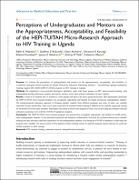| dc.contributor.author | Wakida, Edith K | |
| dc.contributor.author | Rukundo, Godfrey Z | |
| dc.contributor.author | Atuhaire, Clara | |
| dc.contributor.author | Karungi, Christine K | |
| dc.contributor.author | Kumakech, Edward | |
| dc.contributor.author | Haberer, Jessica E | |
| dc.contributor.author | Talib, Zohray M | |
| dc.contributor.author | Obua, Celestino | |
| dc.date.accessioned | 2022-05-26T07:30:43Z | |
| dc.date.available | 2022-05-26T07:30:43Z | |
| dc.date.issued | 2022 | |
| dc.identifier.citation | Wakida, E. K., Rukundo, G. Z., Atuhaire, C., Karungi, C. K., Kumakech, E., Haberer, J. E., ... & Obua, C. (2022). Perceptions of Undergraduates and Mentors on the Appropriateness, Acceptability, and Feasibility of the HEPI-TUITAH Micro-Research Approach to HIV Training in Uganda. Advances in Medical Education and Practice, 13, 323. | en_US |
| dc.identifier.uri | https://hdl.handle.net/123456789/404 | |
| dc.description.abstract | Purpose: To evaluate the perceptions of undergraduates and mentors on the appropriateness, acceptability, and feasibility of
a mentored seed-grant (micro-research) by Health Professions Education Partnership Initiative - Transforming Ugandan Institutions
Training Against HIV/AIDS (HEPI-TUITAH) program on HIV training in Uganda.
Methods: We conducted a cross-sectional descriptive qualitative study with focus groups, on HIV micro-research training, with
undergraduate health professions students and faculty mentors across three partner institutions in rural Uganda.
Results: A total of 24 students and 13 mentors (5–8 per group) took part in the focus group discussions. Most participants stated that
the HEPI-TUITAH micro-research program was acceptable, appropriate and feasible for health professions undergraduate students.
The interprofessional education approach of bringing together students from different programs and years of study was valuable
especially for peer mentorship. There was a need to provide for institution-based training in addition to the centrally organized training
for the benefit of all the team members. Participants also noted a need for the program to find a way of providing the students with data
collection experience even with the COVID-19 pandemic situation.
Conclusion: The HEPI-TUITAH micro-research program was perceived as acceptable, appropriate, and feasible for health professions
undergraduate students. It also promoted teamwork and academic collaboration. Provision for institution-based micro-research
training activities and data collection experiences for the undergraduate students even during the COVID-19 pandemic would make the
program more valuable. The lessons learnt will be applied to future training cohorts to optimize program impact and may be useful for
similar programs in other settings. | en_US |
| dc.language.iso | en | en_US |
| dc.publisher | Advances in Medical Education and Practice | en_US |
| dc.subject | HIV research training | en_US |
| dc.subject | mentored research | en_US |
| dc.subject | interprofessional education | en_US |
| dc.title | Perceptions of Undergraduates and Mentors on the Appropriateness, Acceptability, and Feasibility of the HEPI-TUITAH Micro-Research Approach to HIV Training in Uganda | en_US |
| dc.type | Article | en_US |

